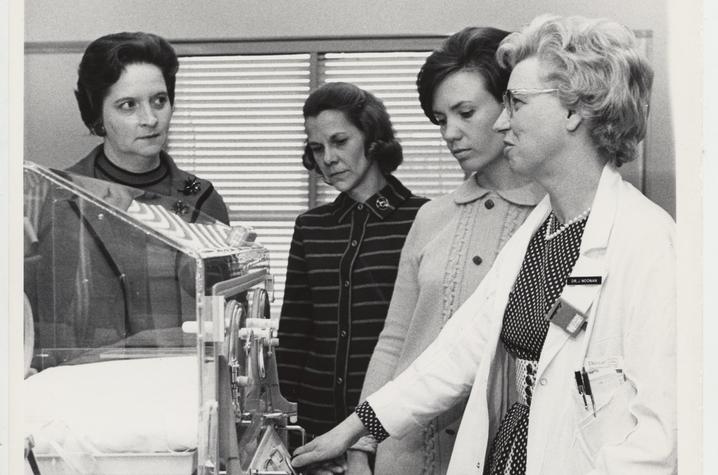Tracing a line of success: Jackie Noonan to April Young
In celebration of the University of Kentucky’s 160th anniversary, this summer series spotlights UK trailblazers who have made history both on campus and beyond — and, ultimately, paved the way for future generations to follow. From sports and health care to the world of art, their stories reflect the enduring legacy of the Big Blue Nation.
LEXINGTON, Ky. (July 3, 2025) — In the summer of 2020, the University of Kentucky’s alumni community lost a member who distinguished herself as a remarkable figure in health care — Jacqueline “Jackie” A. Noonan.
Originally from Burlington, Vermont, Noonan is still celebrated, especially for her devotion to children of Kentucky, where she devoted most of her life for more than a century.
In 1961, Noonan was one of the few to inaugurate the then-brand-new College of Medicine at the University of Kentucky, where she soon found her voice in researching a condition that now carries her name.
Since 1963, Noonan’s focus concentrated on writing scientific papers on a rare type of heart defect and genetic disorder that stops the function of certain parts of the body. Today, this type of syndrome is named after her, known widely as Noonan syndrome.
Establishing her influence in 1974 as the first woman appointed to chair a department in the College of Medicine, Noonan became a leading figure in pediatric cardiology beyond the Bluegrass, later being named one of the Best Women Doctors in America by Harper’s Bazaar and receiving a Lifetime Achievement Award from The Best Doctors in America.
Noonan was known for not limiting herself to laboratory work, but for wanting to know the names and faces of the children she dedicated her life to treating.
She would leave campus to meet individually with patients afflicted with genetic heart diseases, many of whom could not travel to seek care.
Motivated by the same dedication and service to the community, a fresh name deserves its due: April Young, Ph.D.
As an alum of UK’s College of Public Health — and now professor in the college’s Department of Epidemiology and faculty associate with UK’s Center on Drug and Alcohol Research — Young represents a hopeful path for Kentucky.
Just as Noonan did, Young leads scientific projects with the aim of identifying practical solutions within the state, as a process of service.
For more than 10 years, Young has been immersed in substance use disorder research in rural areas of Kentucky and has led projects, such as Care2Hope, to work with communities and identify strategies for reducing drug-related harms adapted to the remote context of 12 Kentucky counties.
Young’s greatest focus has been on reducing Kentucky’s opioid overdose crisis and finding more effective ways to prevent HIV and hepatitis C in vulnerable communities, such as rural Appalachia. As part of UK’s research team on the HEALing Communities Study, Young played an instrumental role in the effort to reduce overdose deaths in sixteen counties in Kentucky.
Young’s work expands beyond Kentucky and has included communities in the Philippines and Kenya, particularly in her research on HIV and vaccine acceptance.
One of UK’s key missions, health care, is supported by names that go above and beyond when it comes to working with communities to address their needs.
As the state’s flagship, land-grant institution, the University of Kentucky exists to advance the Commonwealth. We do that by preparing the next generation of leaders — placing students at the heart of everything we do — and transforming the lives of Kentuckians through education, research and creative work, service and health care. We pride ourselves on being a catalyst for breakthroughs and a force for healing, a place where ingenuity unfolds. It's all made possible by our people — visionaries, disruptors and pioneers — who make up 200 academic programs, a $476.5 million research and development enterprise and a world-class medical center, all on one campus.





